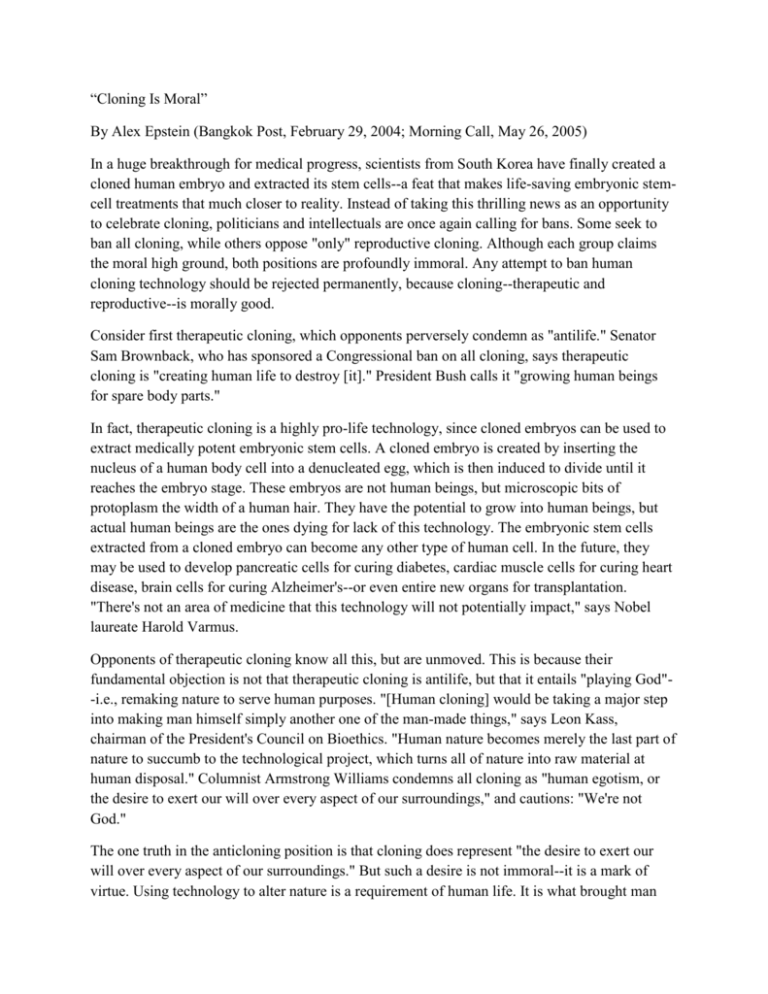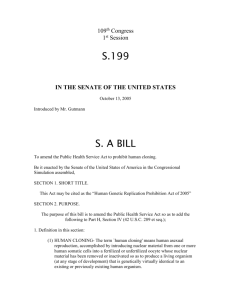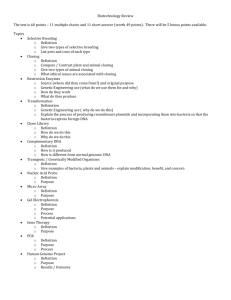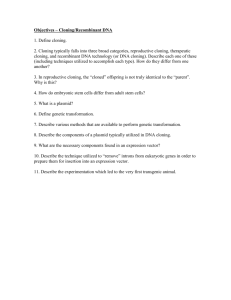Word Doc
advertisement

“Cloning Is Moral” By Alex Epstein (Bangkok Post, February 29, 2004; Morning Call, May 26, 2005) In a huge breakthrough for medical progress, scientists from South Korea have finally created a cloned human embryo and extracted its stem cells--a feat that makes life-saving embryonic stemcell treatments that much closer to reality. Instead of taking this thrilling news as an opportunity to celebrate cloning, politicians and intellectuals are once again calling for bans. Some seek to ban all cloning, while others oppose "only" reproductive cloning. Although each group claims the moral high ground, both positions are profoundly immoral. Any attempt to ban human cloning technology should be rejected permanently, because cloning--therapeutic and reproductive--is morally good. Consider first therapeutic cloning, which opponents perversely condemn as "antilife." Senator Sam Brownback, who has sponsored a Congressional ban on all cloning, says therapeutic cloning is "creating human life to destroy [it]." President Bush calls it "growing human beings for spare body parts." In fact, therapeutic cloning is a highly pro-life technology, since cloned embryos can be used to extract medically potent embryonic stem cells. A cloned embryo is created by inserting the nucleus of a human body cell into a denucleated egg, which is then induced to divide until it reaches the embryo stage. These embryos are not human beings, but microscopic bits of protoplasm the width of a human hair. They have the potential to grow into human beings, but actual human beings are the ones dying for lack of this technology. The embryonic stem cells extracted from a cloned embryo can become any other type of human cell. In the future, they may be used to develop pancreatic cells for curing diabetes, cardiac muscle cells for curing heart disease, brain cells for curing Alzheimer's--or even entire new organs for transplantation. "There's not an area of medicine that this technology will not potentially impact," says Nobel laureate Harold Varmus. Opponents of therapeutic cloning know all this, but are unmoved. This is because their fundamental objection is not that therapeutic cloning is antilife, but that it entails "playing God"-i.e., remaking nature to serve human purposes. "[Human cloning] would be taking a major step into making man himself simply another one of the man-made things," says Leon Kass, chairman of the President's Council on Bioethics. "Human nature becomes merely the last part of nature to succumb to the technological project, which turns all of nature into raw material at human disposal." Columnist Armstrong Williams condemns all cloning as "human egotism, or the desire to exert our will over every aspect of our surroundings," and cautions: "We're not God." The one truth in the anticloning position is that cloning does represent "the desire to exert our will over every aspect of our surroundings." But such a desire is not immoral--it is a mark of virtue. Using technology to alter nature is a requirement of human life. It is what brought man from the cave to civilization. Where would we be without the men who "exerted their will" over their surroundings and constructed the first hut, cottage, and skyscraper? Every advance in human history is part of "the technological project," and has made man's life longer, healthier, and happier. These advances are produced by those who hold the premise that suffering and disease are a curse, not to be humbly accepted as "God's will," but to be fought proudly with all the power of man's rational mind. The same virtue applies to reproductive cloning--which, despite the ridiculous, horror-movie scenarios conjured up by its opponents, would simply result in time-separated twins just as human as anyone else. Once it becomes safe, reproductive cloning will have legitimate uses for infertile couples and for preventing the transmission of genetic diseases. Even more important, it is significant as an early form of a tremendous value: genetic engineering, which most anticloners object to because as such it entails "playing God" with the genetic makeup of one's child. At stake with reproductive cloning is not only whether you can conceive a child who shares your genetic makeup, but whether you have the right to improve the genetic makeup of your children: to prevent them from getting genetic diseases, to prolong their lifespan or to improve their physical appearance. You should have such rights just as you have the right to vaccinate your children or to fit them with braces. The mentalities that denounce cloning and "playing God" have consistently opposed technological progress, especially in medicine. They objected to anesthesia, smallpox inoculations, contraception, heart transplants, in vitro fertilization--on the grounds that these innovations were "unnatural" and contrary to God's will. To let them cripple biotechnological progress by banning cloning would be a moral abomination. Alex Epstein was a writer and a fellow on staff at ARI between 2004 and 2011. Original Source Information: Epstein, Alex. "Cloning Is Moral." ARC: Ayn Rand Center for Individual Rights. Ayn Rand Institute, 2005. Web. 24 Oct. 2013. <http://www.aynrand.org/ site/News2?news_iv_ctrl=1087&page=NewsArticle&id=8018>.






